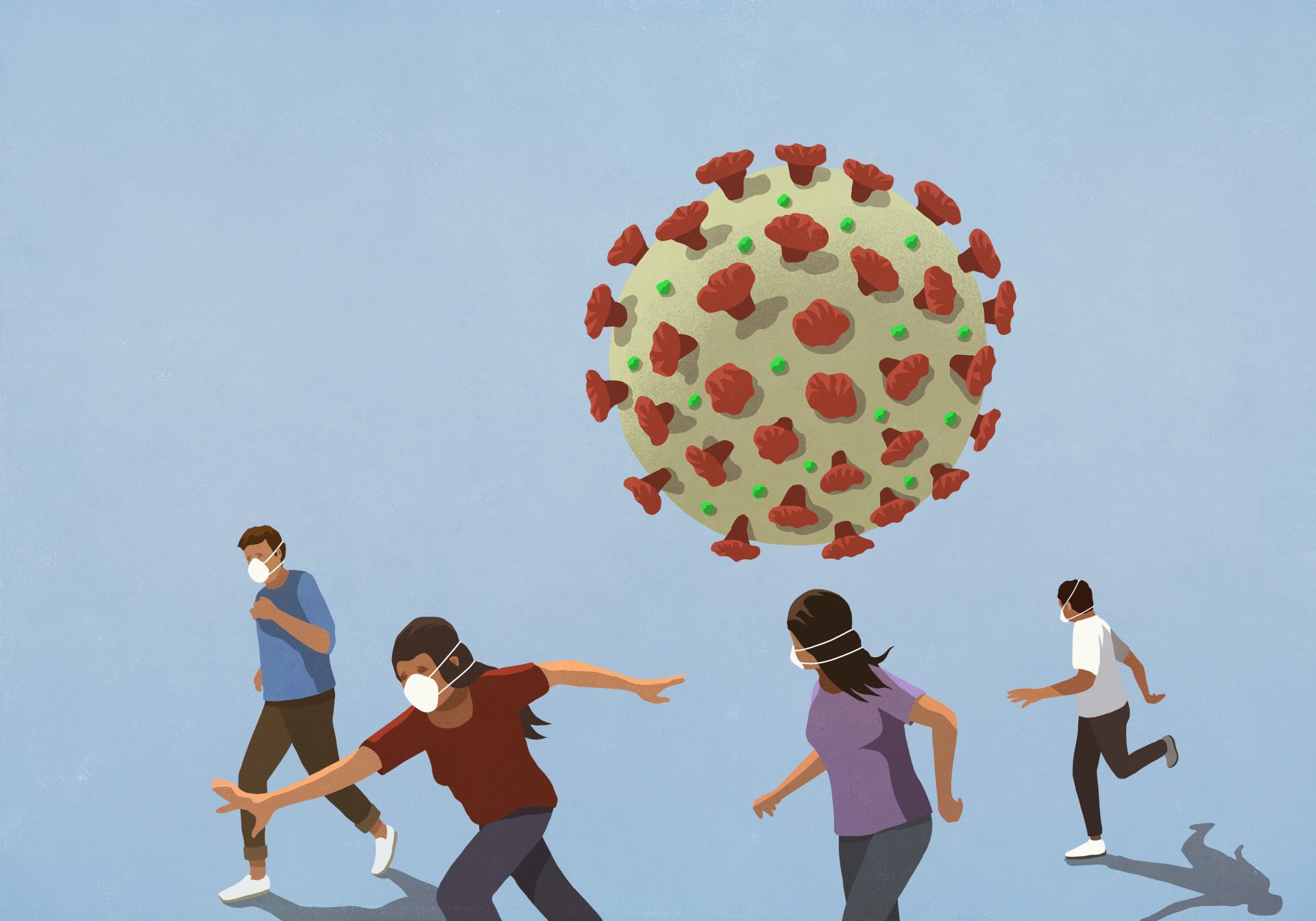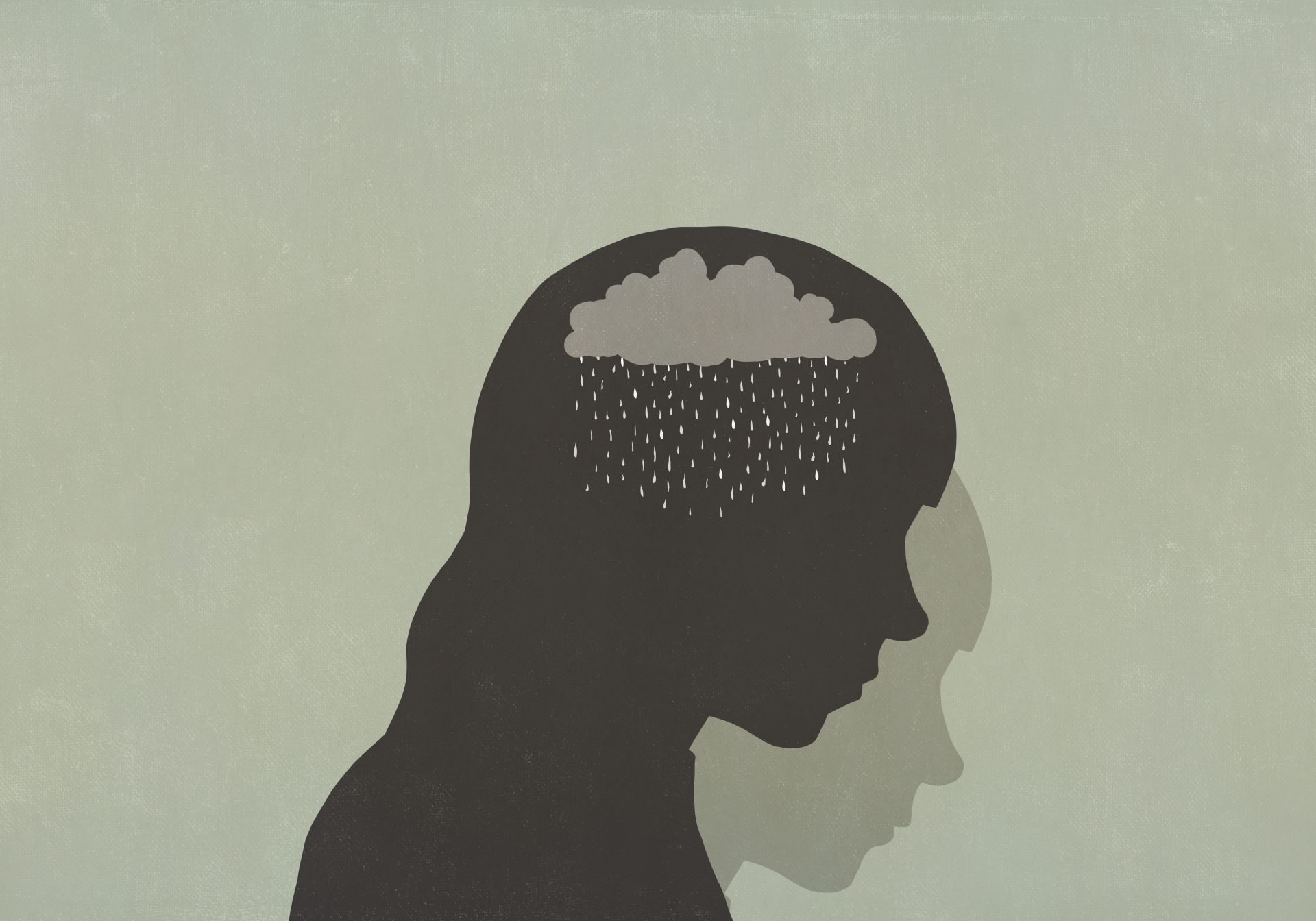Written by Kayleigh Dray
Kayleigh Dray is Stylist’s digital editor-at-large. Her specialist topics include comic books, films, TV and feminism. On a weekend, you can usually find her drinking copious amounts of tea and playing boardgames with her friends.
A psychotherapist explains what we must do to help put a stop to all of our Covid-induced anxiety around death.
My day began much like any other: I woke up, blearily groped for my phone, and took a quick scroll through my social media feeds. I put my phone down. Then, as something clicked in my brain, I picked it up again and went back through my feeds again.
I hadn’t imagined it – although, Christ, I really wish I had. Because there, in big bold letters, The Surrey Comet informed me that a temporary morgue had been set up about, ooh, 20 minutes from my house “to store Covid dead.”
Just as I’ve made a point of doing with the ever-rising coronavirus death toll, I decided the best course of action was to… well, was just to pretend nothing was wrong. To draw a veil over this unsettling news bulletin, push it to the very darkest recesses of my mind, and go about my day as normal. So I kicked off the duvet, hopped in the shower, swallowed the sudden lump in my throat, and sang along reedily to my favourite bathroom ballads (Celine Dion, eat your heart out).
This done, I headed downstairs and brewed myself a cup of peppermint tea, ignoring the low hum of anxiety running through me. I logged into my morning meeting over Zoom and pasted a smile over my (slightly paler than normal) face. I cracked jokes, I laughed along as people shared their anecdotes, I made notes, I hit mute whenever I needed to take a few deep, steadying breaths. I shut down the call, I cried a little, I started working on a TV roundup.
Then, when I filed my copy, I cried again. It felt as if I could barely breathe and, when I finally got myself under control and back to work, I found I was still shivering, that my heart was still pounding inside my chest, and that I was still shaking like mad.

Thus went my day. And, when my head hit the pillow later the same night, I found myself plagued by fears of this seemingly never-ending global plague, and of death. Not the skeleton with the scythe, and not my own mortality, but of… well, just of death, full stop.
Because, to paraphrase Wet Wet Wet’s 1994 song, death is seemingly all around us, and so my anxiety grows.
“It sounds like death anxiety,” Stylist’s Lucy Robson tells me, when I mention my experience to her.
And so, with these words burning in my mind, I reach out to psychotherapist Ruairi Stewart (aka The Happy Whole Coach).
“It’s very normal to feel anxious around death,” Stewart reassures me. “And, as Winston Churchill famously said, ‘Any man who says he is not afraid of death is a liar’.”
He adds: “It has been speculated that death anxiety or thanatophobia as it is medically known, is considered one of the most common human fears.
“It could be described as a free-floating anxiety that is often ignored and repressed which then leads to it surfacing in other ways.”
But why is my initial reaction to brush all of my feelings around death under the carpet, I wonder? Well, because, as Stewart explains, our day-to-day existences typically don’t tend to remind us of our own mortality.
“In the western world we usually only face the reality of death when in the process of losing a loved one,” he says.
“A lot of people find the thought of death uncomfortable, but having the occasional thought or fear around this is totally normal. When it starts to have a negative impact on your ability to manage your day to day life, however, then it is a problem.
“How grief and loss are handled in the face of a loved one passing away is also a large part of how people tend to frame and experience their own understanding of death. Death can serve as a very painful reminder for people, depending on the nature of the losses they may have endured – how the person died, how this grief was processed and handled, or even the amount of loss a person has experienced and over what amount of time.
“This is something I’m sure a lot of people are struggling with at the moment due to the death tolls around the pandemic constantly updated in the media: it’s a stark reminder of our own mortality.”
Stewart adds reassuringly: “On an intellectual level, we know that life ends for us all at some point. This is still an uncomfortable truth to sit with, however, and the thought of our own mortality is something we tend to push down and deny for the most part.
“It is too overwhelming to be at the forefront of your mind all the time so it ends up dwelling in the subconscious and can subliminally influence behaviours and coping mechanisms when it comes to thinking about death.”
So what can we do to help put a stop to all of our Covid-induced anxiety? Well, Stewart says we need to take the time necessary to get comfortable with the concept of death.
“We all think about our five year plans from time to time, but how often do you sit with the realisation that you are going to die, how often do you reflect on how you’ve been living your life and what would you change if you knew you only had a little time left?” he asks.
“These are intense thoughts but also powerful tools to shift your perspective on things.”
Stewart continues: “There is so much global grief and trauma that we are collectively experiencing right now. People are losing loved ones in the most traumatic ways, the death tolls are constantly in the news and we have a sense of feeling trapped in our homes with the knowledge of it all.
“We need to shift our perspective to take responsibility for how we are currently living our lives,” he adds. “Ask yourself if you’re unhappy, or if anything needs to change, and use these thoughts to help give you clarity.
“They will serve as a reminder that this is your responsibility and something you can control. Choosing to bravely face trauma and work through dark times will help to heal.”
Angharad Burden, Marie Curie’s information and support bereavement service coordinator, agrees wholeheartedly with Stewart, saying that it’s vital we all take the time to confront our fears around death.
More important than even this, though? We must pluck up the courage to talk to loved ones about it, too.

“Our own mortality can be one of the hardest things to accept but taking the time to have important conversations can make a big difference,” Burden says.
“Many people we support wish they’d been able to have these conversations to better understand their loved ones’ wishes before they died. I like to think about it as an act of kindness and love. At a time when the people that are important to you may be experiencing a range of powerful emotions and grief, you will have already acknowledged and shared your final wishes.”
Burden continues: “It can be difficult to know where to start and this doesn’t have to happen in a formal setting. You can talk over dinner, a walk in the park or during a car journey. The more you talk the more natural and comfortable it can become.
“Start by reflecting on a memory, maybe a photograph or piece of music that means a lot to you – it can help start the conversation. Marie Curie has a set of conversation cards you can order that will help you and your loved ones start talking and remove any pressure about knowing where to start.
“Questions include: ‘What was the last thing that made you laugh out loud?’ and ‘Name the three songs you’d like at your funeral’. This gives you the opportunity to understand the people you care about better, perhaps agree or disagree with questionable music choices, but ultimately save unnecessary stress and confusion later.”
Burden adds: “We are all unique and talking about death can be daunting, so try not to force it. There are books, pieces of music, documentaries and films that all introduce the topic of dying and death in a way that may be more accessible to you. You may also wish to express your own feelings creatively. I often hear of people writing songs, creating drawings or painting their thoughts and feelings, which can be both cathartic for you and informative for your loved ones.”
“It’s easy to not talk about your own mortality but it could be incredibly difficult on those you leave behind if you don’t. Marie Curie can help you think, talk and plan for the end of life. It’s never too soon, until it’s too late.”
Marie Curie can help you and your family or friends open up the conversation, share your thoughts and feelings, discuss your wishes and make plans earlier in life, for what you and your loved ones want for the end of life experience. Visit www.mariecurie.org.uk/talkabout to find ideas and tools to help you get started or call the Marie Curie Support Line free on 0800 090 2309.
Marie Curie Talkabout Conversation Cards are available to order on the Marie Curie online shop.
Images: Getty
Source: Read Full Article